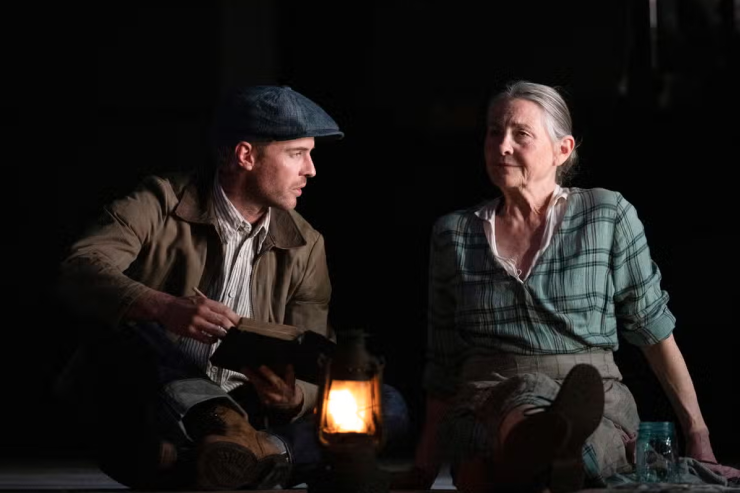Review: The Grapes of Wrath

There are a frankly depressing number of parallels between John Steinbeck’s 1939 masterpiece The Grapes of Wrath and the current state of the world, from humanitarian disasters caused by ecological collapse to the plight of vulnerable migrants and the failure of the penal system.
It follows the Joads, a family stripped of their income after dust storms destroyed the Oklahoma crop following years of over-farming. They hear of the promise of work in far-flung California and set off on an treacherous road-trip, three generations of the family all hanging off a rusty, cloth-covered van.
Director Carrie Cracknell plays things fairly straight in terms of period realism, with everything from the dusty old costumes to the ramshackle farming huts and the towns of sad, sagging migrant tents all evoking the stark reality of depression-era America.
There are some impressive audio-visual flourishes, from the raging storm on which the production opens, featuring cast members tied to bungee cords straining against the wind, to the wistful musical interludes played by a live, on-stage band and the screen behind the stage that subtly shifts hue to change the ambience from crisp morning to hazy sunset.
But despite all this, something just feels… off. The Grapes of Wrath is a road novel and therein lies the problem with this – or any – theatrical adaptation: there’s not much room on a stage for driving. The Joads’ beat up old truck instead spins in place, moving but never really going anywhere, and as the play drags on – it lasts almost three hours – this starts to feel like a metaphor for the production itself.
Things are not helped by the pacing of the novel, which deliberately ends not with a bang but with a terrible whimper, the Joads realising there is no pot of gold at the end of the Californian rainbow, just a new flavour of misery. The conclusion is a small, harrowing microcosm of the wider catastrophe, perfect on the page but a little unsatisfying on the stage.
For those who didn’t read The Grapes of Wrath at school, it’s exceptionally bleak. When we think of authors and playwrights who pushed the boundaries of acceptability, Sarah Kane and Bret Easton Ellis spring to mind – but all the way back in 1939 my boi Steinbeck had a woman, still bloodied from a miscarriage, breast-feeding a starving stranger (to be fair, the ancient Greeks were creating messed up literature 2,000 years before it was cool).
Steinbeck was a masterful chronicler of this dark chapter in history but the most miserable thing of all is how few of these problems have been solved 85 years later.

